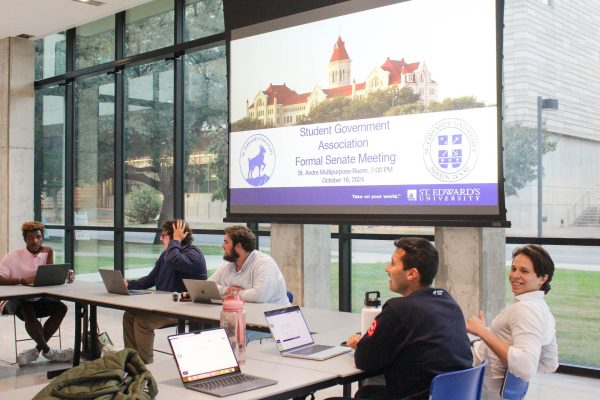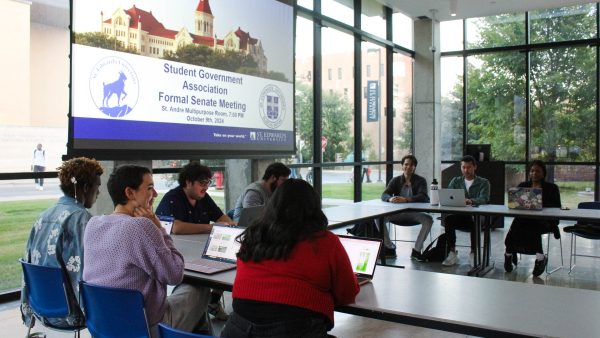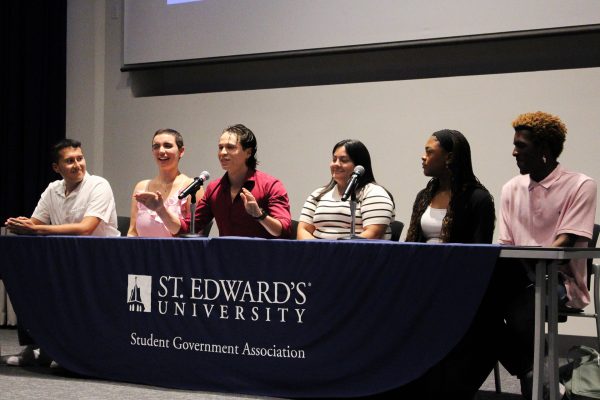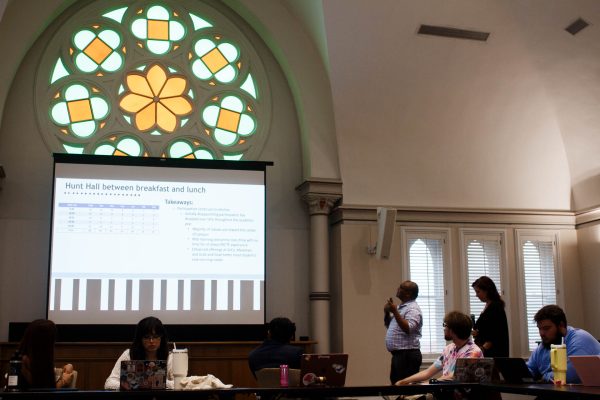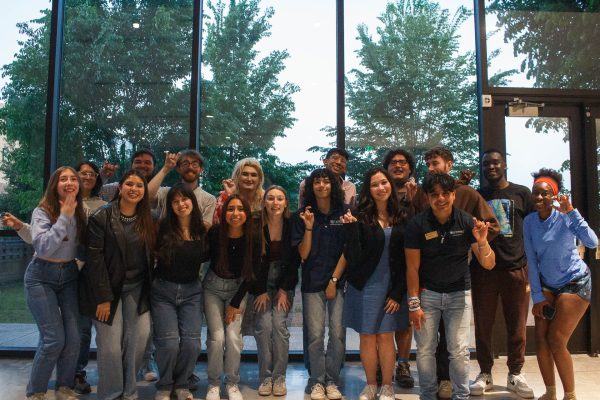SGA candidates debate strategy
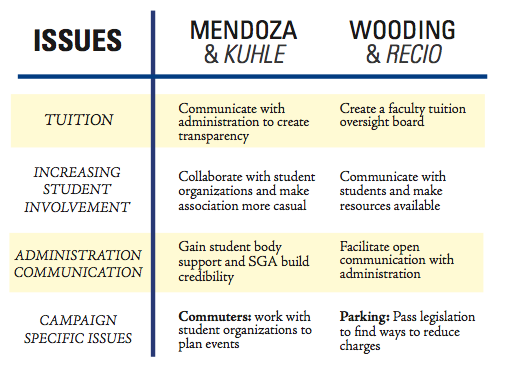
Presidental candidates campaign for similar issues but approach topics with different plans.
On April 4 the St. Edward’s University Student Government Association held debates for candidates running in the 2014-2015 Senate elections to discuss their campaign platform and their qualifications for the positions.
About 50 students attended the debates, which lasted about two and a half hours and covered a range of topics. President and vice presidential candidates Samantha Mendoza and George Kuhle are running against John Wooding and Souther Recio. While both partners have a unique campaign platform, some issues, including communication about rising tuition, are being advocated for by both groups.
One major topic of discussion at the debate involved candidate’s plans to bridge the gap between the St. Edward’s administration, the SGA association and the student body.
Mendoza and Kuhle argued that they there should be less distinction between SGA and the student body, since SGA senators are still students first and foremost.
“We are acting as the student body rather than SGA,” Mendoza said.
Mendoza and Kuhle plan to develop a collaboration strategy between SGA senators and student organizations on campus.
“We want to go out and learn about that person,” Kuhle said. “What are they doing on campus? We expect them to come to us, but we need to learn about our peers.”
Kuhle said he feels the only way to gain more respect and attention from the administration is to raise the level of student involvement and support for the issues SGA brings before the administration.
“We need to encourage the student body’s support,” Kuhle said. “The credibility of SGA is just not there. Once we establish that credibility I firmly believe the administration will begin to take us more seriously.”
Wooding and Recio plan to approach this issue in a similar way and also hope to garner more involvement from the student body. However, Wooding acknowledged that tackling big issues, such as tuition, would not happen immediately.
“We aren’t going to accomplish this in one year, but we don’t want that to stop us. It will be difficult, but won’t be impossible,” Wooding said.
Recio said that she would start bridging the gap between SGA and the student body by making the resources available in the Student Life office more accessible and welcoming to students.
“It’s a little cliquey and I don’t think it should be like that. It’s a place for students to unwind and relax, and doors are open to everyone,” Recio said.
While Wooding said his “first and foremost concern is taking care of students,” he said that the best way to better SGA’s relationship with the administration is to begin having honest conversations.
One issue at the top of Wooding and Recio’s campaign is parking ticket costs. Wooding said he believes the cost for on-campus parking tickets is excessively high, and he would like to change this if elected.
“There’s not much we can do about parking space, but we need to find a way to reduce charges,” Wooding said.
Since working to change this issue, as well as increasing tuition, will require working closely with the administration, Wooding plans to create a student faculty tuition oversight board to facilitate more open communication.
“This isn’t an easy job, and you get told no, and you just have to come back with more creative ideas,” Recio said.
One issue stressed in Mendoza’s campaign platform is greater resources and support for commuter students.
“We really want to create more of a commuter community on campus and have some place for them to go between classes to feel welcome,” Mendoza said.
Once again, Mendoza and Kuhle’s plan to accomplish this is founded on collaboration. She plans to work with other student organizations on campus and use her experience working on the transitional experiences council to approach this issue.
Many questions raised during the debate investigate the candidates’ qualifications for the job and their previous involvement on campus.
Wooding stressed his previous involvement in College Democrats and SGA. He said his past experiences in life have developed values of hard work and perseverance.
“One of the greatest things I bring to the table is real world experience,” Wooding said.
His running mate, Recio, said that her experiences working in the Mary Moody Northen Theatre, being involved in SGA and being a transfer student contribute to her strength as a vice president candidate.
“If you are not passionate about what you’re doing as a senator you aren’t going to be successful,” Recio said. “Taking that energy and bringing that with me, that’s my goal. To get everyone as excited as I am.”
While Mendoza lacks previous experience in SGA, she has been involved in many other organizations and programs on campus, including Hilltop Views, Residence Life and Leading EDGE. She has served as a teaching assistant, resident assistant and student orientation leader. She feels that these team building and leadership experiences have shaped her into a driven presidential candidate.
“I love this school and I am passionate about it,” Mendoza said. “I’ve had the opportunity to really reach out and make change and I want to continue that.”
Her running mate, Kuhle, served as the SGA Chief of Staff during the 2013-2014 school year. He also cited his experiences working as a SERVE one-day coordinator, a student ambassador and a desk worker in the Ragsdale Center as examples of his involvement of campus.
“We’re not politicians, we are just fellow students looking to help the student body,” Kuhle said. “We’re not going to be perfect, but we are going to give you 100 percent every day until we graduate.”
After the candidates answered questions posed by SGA Parliamentarian Rebecca Thomas, the floor was opened to student questions. Several students brought specific questions before the candidates and asked for clarification about previous answers. Students were also able to ask questions using Twitter.
Junior Damion Laverne felt that the debates helped him understand the candidates stance on different issues, but did not change his vote.
“It did (help me) in the sense that I got to know more about the candidates, their qualifications, and their convictions,” Laverne said. “It did not (help me) in the sense that I already knew who I was going to vote for.”
At the end of the debate both candidates offered their respect and congratulations to each other and stressed their desire for students to go online and vote.
“I’m excited about where SGA is headed,” Wooding said.
Students can vote online at Collegiate Link or myHilltop through April 16 at 4 p.m.







